- Home
- Jeff Lindsay
Dexter by Design Page 2
Dexter by Design Read online
Page 2
Still, it was an interesting twist, and I might have been more than willing to look at the other video clips under ordinary circumstances. But it did seem to me that I had some kind of responsibility toward Rita, and this was clearly not the sort of thing she could see and still maintain a sunny outlook. “Come on,” I said. “Let’s go get some dessert.”
But she just shook her head and repeated, “It HAS to be a trick,” and she moved on to the next screen.
I moved with her and was rewarded with another fifteen-second loop of the young woman in the same costume. In this one she actually appeared to be removing a chunk of flesh from her leg. Her expression here moved into dumb and endless agony, as if the pain had gone on long enough that she was used to it, but it still hurt. And strangely enough, this expression reminded me of the face of the woman at the end of a movie Vince Masuoka had shown at my bachelor party—I believe it was called Frat House Gang Bang. There was a gleam of I-Showed-You satisfaction visible through the fatigue and the pain as she looked down at the six-inch patch between her knee and her shin where all the flesh was peeled off to reveal the bone.
“Oh my God,” Rita murmured. And for some reason she moved on to the next monitor.
I do not pretend to understand human beings. For the most part I try to maintain a logical outlook on life, and this is usually a real disadvantage in trying to figure out what people really think they’re doing. I mean, as far as I could tell, Rita truly was as sweet and pleasant and optimistic as Rebecca of Sunnybrook Farm. The sight of a dead cat beside the road could move her to tears. And yet here she was, methodically moving through an exhibit that was clearly far worse than anything she had ever imagined. She knew that the next clip would be more of the same, graphic and appalling beyond belief. And yet, instead of sprinting for the exit, she was calmly moving on to the next screen.
More people drifted in, and I watched them go through the same process of recognition and shock. The Passenger was clearly enjoying things, but to be perfectly truthful, I was beginning to think that the whole affair was wearing a little thin. I could not really get into the spirit of the event and feel any sense of fun from the audience’s suffering. After all, where was the point? Okay, Jennifer cut off pieces of her leg. So what? Why bother inflicting enormous pain on yourself when sooner or later Life would certainly get around to doing it for you? What did it prove? What happened next?
Still, Rita seemed determined to make herself as uncomfortable as possible, moving relentlessly from one video loop to the next. And I could think of nothing else to do but follow along in her wake, nobly enduring as she repeated “Oh God. Oh my God” at each new horror.
At the far end of the room, the largest clump of people stood looking at something on the wall that was angled away so we could only see the metal edge of the frame. It was clear from their faces that this was a real doozy, the climax of the show, and I was a little impatient to get to it and get things over with, but Rita insisted on seeing every clip along the way first. Each one showed the woman doing more dreadful things to her leg, until finally, in the last one, a slightly longer clip that showed her sitting still and staring down at her leg, there was nothing left but smooth white bone between her knee and her ankle. The flesh on the foot was left intact, and looked very odd at the end of the pale length of bone.
Even odder was the expression on Jennifer’s face, a look of exhausted and triumphant pain that said she had clearly proved something. I glanced again at the program, but I found nothing to say what that something was.
Rita had no apparent insight, either. She had fallen into a numb silence, and simply stared at the final clip, watching it three times before shaking her head a last time and moving on as if hypnotized to where the larger group of people stood clustered around the Something in the metal frame at the far end of the room.
It proved to be by far the most interesting piece in the exhibit, the real clincher as far as I was concerned, and I could hear the Passenger chuckling agreement. Rita, for the first time, was unable even to muster another repeat of “Oh my God.”
Mounted on a square of raw plywood and set in a steel frame was Jennifer’s leg bone. The whole thing this time, including everything from the knee down.
“Well,” I said. “At least we know for sure it isn’t trick photography.”
“It’s a fake,” Rita said, but I don’t think she believed it.
Somewhere outside in the bright lights of the world’s most glamorous city, the church bells were striking the hour. But inside the little gallery there was very little glamour, and the bells sounded unusually loud—almost loud enough to cover another sound, the sibilance of a small familiar voice letting me know that things were about to get even more interesting, and because I have learned that this voice is almost always right, I turned around to look.
Sure enough, the plot was thickening even as I glanced at the front of the room. Because as I watched, the door swung open, and with a rustle of spangles, Jennifer herself came in.
I had thought the room was quiet before, but it had been Mardi Gras compared to the silence that followed her as she clumped down the length of the room on crutches. She was pale and gaunt. Her stripper’s costume hung loosely from her body, and she walked slowly and carefully, as if she was not yet used to the crutches. A clean white bandage covered the stump of her newly missing leg.
As Jennifer approached us where we stood in front of the mounted leg bone, I could feel Rita shrink back, away from any possible contact with the one-legged woman. I glanced at her; she was nearly as pale as Jennifer, and she had apparently given up breathing.
I looked back up. Just like Rita had done, the rest of the crowd, with their unblinking eyes fixed on Jennifer, edged away from her path, and she finally came to a halt only a foot in front of her leg. She stared at it for a long moment, apparently unaware that she was depriving an entire roomful of people of oxygen. Then she raised one hand off the crutches, leaned forward, and touched the leg bone.
“Sexy,” she said.
I turned to Rita, thinking I might whisper “ars longa,” or words to that effect. But it was no use.
Rita had fainted.
THREE
WE ARRIVED HOME IN MIAMI ON A FRIDAY EVENING, two days later, and the mean-spirited surge of the crowd in the airport as they cursed and shoved one another around the baggage carousel nearly brought a tear to my eye. Someone tried to walk off with Rita’s suitcase, and then snarled at me when I took it away, and this was all the welcome I needed. It was good to be home.
And if any further sentimental greeting was necessary, I got it bright and early on Monday morning, my first day back at work. I stepped off the elevator and bumped into Vince Masuoka. “Dexter,” he said, in what I am sure was a very emotional tone of voice, “did you bring doughnuts?” It was truly heartwarming to realize that I had been missed, and if only I had a heart, I am sure it would have been warmed.
“I no longer eat doughnuts,” I told him. “I only eat croissants.”
Vince blinked. “How come?” he said.
“Je suis Parisien,” I said.
He shook his head. “Well, you should have brought doughnuts,” he said. “We got a really weird one out on South Beach this morning, and there’s no place out there to get doughnuts.”
“Quel tragique,” I said.
“Are you gonna stay like this all day?” he said. “’Cause this could be a really long one.”
It was, in fact, a long one, made longer by the mad crush of reporters and other gawkers who already stood three deep at the yellow crime-scene tape strung up around a chunk of beach not too far from the southernmost tip of South Beach. I was already sweating when I worked my way through the crowd and onto the sand, over to where I saw Angel Batista-No-Relation already down on his hands and knees about twenty feet from the bodies, examining something that no one else could see.
“What’s weird?” I asked him.
He didn’t even look up. “Tits on a fr
og,” he said.
“I’m sure you’re right. But Vince said there’s something weird about these bodies.”
He frowned at something and bent closer to the sand.
“Don’t you worry about sand mites?” I asked him.
Angel just nodded. “They were killed somewhere else,” he said. “But one of them dripped a little.” He frowned. “But it’s not blood.”
“How lucky for me.”
“Also,” he said, using tweezers to put something invisible into a plastic bag, “they got…” And he paused here, not for any reason connected with unseen objects, but as if to find a word that wouldn’t frighten me, and in the silence I heard a rising whir of stretching wings from the dark backseat of the Dexter-mobile.
“What?” I said, when I could stand it no longer.
Angel shook his head slightly. “They got—arranged,” he said, and as if a spell had broken, he jerked into motion, sealing his plastic bag, placing it carefully to one side, and then going back down on one knee.
If that was all he had to say on the subject, I would clearly have to go see for myself what all the sibilant silence was about. So I walked another twenty feet to the bodies.
Two of them, one male and one female, apparently in their thirties, and they had not been chosen for their beauty. Both were pale, overweight, and hairy. They had been carefully arranged on gaudy beach towels, the kind so popular with tourists from the Midwest. Casually spread open on the woman’s lap was a bright pink paperback novel with the kind of gaudy cover that people from Michigan love to carry around on vacation: Tourist Season. A perfectly ordinary married couple enjoying a day at the beach.
To underline the happiness they were supposed to be experiencing, each of them had a semitransparent plastic mask stuck onto their face and apparently held in place with glue, the kind of mask that gave the wearer’s face a large and artificial smile while still allowing the actual face to show through. Miami, the home of permanent smiles.
Except that these two had somewhat unusual reasons to smile, reasons that had my Dark Passenger burbling with what very nearly sounded like a case of the giggles. These two bodies had been split open from the bottom of the rib cage down to the waistline, and then the flesh had been peeled back to show what was inside. And I did not need the surge of sibilant hilarity that rose up from my shadowy friend to appreciate that what was inside was just a little bit out of the ordinary.
All of the standard-issue messiness had been removed, which I thought was a very nice start. There was no awful gooey heap of intestines or other glistening horrible guts. Instead, all the dreadful bloody gunk had been scooped out. The woman’s body cavity had then been neatly and tastefully converted into a tropical fruit basket, the kind that might welcome special guests to a good hotel. I could see a couple of mangoes, papayas, oranges and grapefruits, a pineapple, and of course some bananas. There was even a bright red ribbon attached to the rib cage, and poking up out of the middle of the fruit was a bottle of cheap champagne.
The man had been arranged with a somewhat more casual diversity. Instead of the bright and attractive fruit medley, his emptied gut had been filled with a huge and gaudy pair of sunglasses, a dive mask and snorkel, a squeeze bottle of sunscreen, a can of insect repellent, and a small plate of pasteles, Cuban pastries. It seemed like a terrible waste in this sandy wilderness without doughnuts. Propped up on one side of the cavity was some kind of large pamphlet or brochure. I could not see the cover, so I bent over and looked closer; it was The South Beach Swimsuit Calendar. A grouper’s head peeked out from behind the calendar, its gaping fishy face frozen into a smile that was eerily similar to the one on the plastic mask glued to the man’s face.
I heard the hiss of feet through the sand behind me and turned around.
“Friend of yours?” my sister, Deborah, said as she walked over and nodded at the bodies. Perhaps I should say Sergeant Deborah, since my job requires me to be polite to someone who has reached her exalted rank in the police force. And polite I generally am, even to the point of ignoring her snarky remark. But the sight of what she held in her hand wiped away all my political obligations. Somehow, she had managed to come up with a doughnut—a Bavarian cream, my favorite—and she took a large bite. It seemed horribly unfair. “What do you think, bro?” she said through a mouthful.
“I think you should have brought me a doughnut,” I said.
She bared her teeth in a large smile, which did not help anything, since her gums were lined with chocolate frosting from the doughnut in question. “I did,” she said. “But I got hungry and ate it.”
It was nice to see my sister smile, since it was not something she had been doing much of for the last few years; it just didn’t seem to fit in with her cop self-image. But I was not filled with the warm glow of brotherly affection at seeing her—mostly because I was not filled with doughnut, either, and I wanted to be. Still, I knew from my research that the happiness of one’s family was the next-best thing, so I put the best possible face on it.
“I’m very happy for you,” I said.
“No you’re not, you’re pouting,” she said. “What do you think?” And she crammed the last chunk of Bavarian cream into her mouth and nodded down at the bodies again.
Of course, Deborah, of all people in the world, had the right to ask for the benefit of my special insight into the sick and twisted animals who killed like this, since she was my only relative and I was sick and twisted myself. But aside from the slowly fading amusement of the Dark Passenger, I had no particular insight into why these two bodies had been arranged like a welcome message from a very troubled civic booster. I listened intently for a long moment, pretending to study the bodies, but I neither heard nor saw anything, except a faint and impatient clearing of the throat from the shadows inside Chateau Dexter. But Deborah was expecting some sort of pronouncement.
“It seems awfully contrived,” I managed to say.
“Nice word,” she said. “What the fuck does that mean?”
I hesitated. Usually my special insight into unusual homicides makes it easy for me to develop an idea of what kind of psychological chaos produced the heap of human leftovers in question. But in this case, I was drawing a blank. Even a true expert like myself has limits, and whatever trauma created the need to turn a pudgy woman into a fruit basket was beyond me and my interior helper.
Deborah looked at me expectantly. I didn’t want to give her any casual chatter that she might take for genuine insight and charge off in the wrong direction. On the other hand, my reputation required that I offer some kind of learned opinion.
“It’s nothing definite,” I said. “It’s just that—” And I paused for a moment, because I realized that what I had been about to say actually was a genuine insight, and the small encouraging chuckle from the Passenger confirmed it.
“What, goddamn it?” Deborah said, and it was something of a relief to see her return to her own cranky normality.
“This was done with a kind of cold control you don’t see normally,” I said.
Debs snorted. “Normally,” she said. “Like, what—normal like you?”
I was surprised at the personal turn her remarks were taking, but I let it go. “Normal for somebody who could do this,” I said.
“There needs to be some passion, some sign that whoever did this was really, uh—feeling the need to do it. Not this. Not just like, what can I do after that’s fun.”
“This is fun for you?” she said.
I shook my head, irritated that she was deliberately missing the point. “No, it’s not, that’s what I’m trying to say. The killing part is supposed to be fun, and the bodies should reveal that. Instead, the killing wasn’t the point at all, it was just a means to an end. Instead of the end itself … Why are you looking at me like that?”
“Is that what it’s like for you?” she said.
I found myself somewhat taken aback, an unusual situation for Dashing Dexter, always ready with a quip. Deborah wa
s still coming to terms with what I was, and what her father had done with me, and I could appreciate that it was difficult for her to deal with on a daily basis, especially at work—which for her, after all, involved finding people like me and sending them to Old Sparky.
On the other hand, it was truly not something I could talk about with anything approaching comfort. Even with Deborah, it felt like discussing oral sex with your mother. So I decided to sidestep ever so slightly. “My point,” I said, “is that this doesn’t seem to be about the killing. It’s about what to do with the bodies afterward.”
She stared at me for a moment, and then shook her head. “I would love to know what the fuck you think that means,” she said. “But even more, I think I would love to know what the fuck goes on in your head.”
I took a deep breath and let it out slowly. It sounded soothingly like a sound the Passenger might make. “Look, Debs,” I said. “What I’m saying is, we’re not dealing with a killer—we’re dealing with somebody who likes to play with dead bodies, not live ones.”
“And that makes a difference?”
“Yes.”
“Does he still kill people?” she asked.
“It sure looks like it.”
“And he’ll probably do it again?”
“Probably,” I said over a cold chuckle of interior certainty that only I could hear.
“So what’s the difference?” she said.
“The difference is that there won’t be the same kind of pattern. You can’t know when he’ll do it again, or who he’ll do it to, or any of the things you can usually count on to help you catch him. All you can do is wait and hope you get lucky.”
“Shit,” she said. “I never was good at waiting.”

 Double Dexter
Double Dexter Darkly Dreaming Dexter
Darkly Dreaming Dexter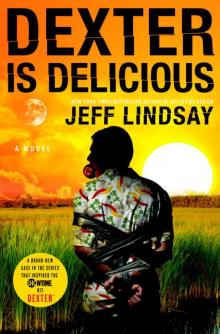 Dexter Is Delicious
Dexter Is Delicious Tropical Depression
Tropical Depression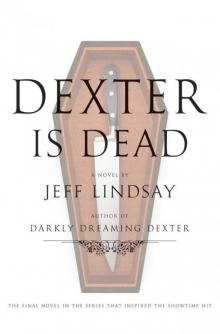 Dexter Is Dead
Dexter Is Dead Dexter's Final Cut
Dexter's Final Cut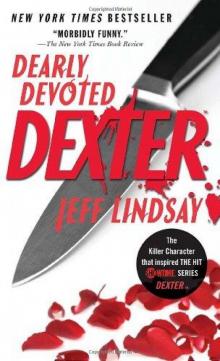 Dearly Devoted Dexter
Dearly Devoted Dexter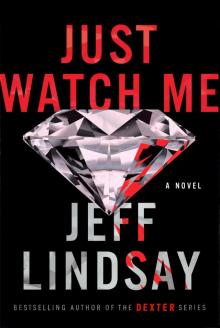 Just Watch Me
Just Watch Me Red Tide
Red Tide Double Dexter: A Novel
Double Dexter: A Novel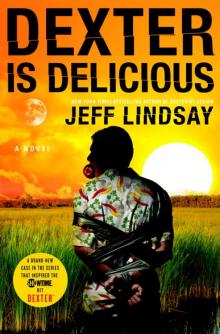 Dexter is Delicious: A Novel
Dexter is Delicious: A Novel Dexter's Final Cut d-7
Dexter's Final Cut d-7